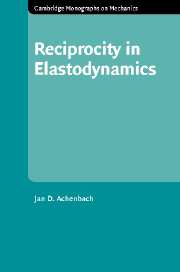Book contents
- Frontmatter
- Contents
- Preface
- 1 Introduction
- 2 Some elastodynamic theory
- 3 Wave motion in an unbounded elastic solid
- 4 Reciprocity in acoustics
- 5 Reciprocity in one-dimensional elastodynamics
- 6 Reciprocity in two- and three-dimensional elastodynamics
- 7 Wave motion guided by a carrier wave
- 8 Computation of surface waves by reciprocity considerations
- 9 Reciprocity considerations for an elastic layer
- 10 Forced motion of an elastic layer
- 11 Integral representations and integral equations
- 12 Scattering in waveguides and bounded bodies
- 13 Reciprocity for coupled acousto-elastic systems
- 14 Reciprocity for piezoelectric systems
- References
- Index of cited names
- Subject index
2 - Some elastodynamic theory
Published online by Cambridge University Press: 10 December 2009
- Frontmatter
- Contents
- Preface
- 1 Introduction
- 2 Some elastodynamic theory
- 3 Wave motion in an unbounded elastic solid
- 4 Reciprocity in acoustics
- 5 Reciprocity in one-dimensional elastodynamics
- 6 Reciprocity in two- and three-dimensional elastodynamics
- 7 Wave motion guided by a carrier wave
- 8 Computation of surface waves by reciprocity considerations
- 9 Reciprocity considerations for an elastic layer
- 10 Forced motion of an elastic layer
- 11 Integral representations and integral equations
- 12 Scattering in waveguides and bounded bodies
- 13 Reciprocity for coupled acousto-elastic systems
- 14 Reciprocity for piezoelectric systems
- References
- Index of cited names
- Subject index
Summary
Introduction
Problems of the motion and deformation of solids are rendered amenable to mathematical analysis by introducing the concept of a continuous medium. In this idealization it is assumed that properties averaged over a very small element, for example the mean mass density and the mean displacement and stress, are continuous functions of position and time. Although it might seem that the microscopic structure of real materials is not consistent with the concept of a continuum, the idealization produces very useful results, simply because the lengths characterizing the microscopic structure of most materials are generally much smaller than any lengths arising in the deformation of the medium. Even if in certain special cases the microstructure gives rise to significant phenomena, these can be taken into account within the framework of the continuum theory by appropriate generalizations.
Continuum mechanics is a classical subject that has been discussed in great generality in numerous treatises. The theory of continuous media is built upon the basic concepts of stress, motion and deformation, upon the laws of conservation of mass, linear momentum, moment of momentum (angular momentum) and energy and on the constitutive relations. The constitutive relations characterize the mechanical and thermal response of a material while the basic conservation laws abstract the common features of mechanical phenomena irrespective of the constitutive relations.
The governing equations used in this book are for homogeneous, isotropic, linearly elastic solids.
- Type
- Chapter
- Information
- Reciprocity in Elastodynamics , pp. 13 - 29Publisher: Cambridge University PressPrint publication year: 2004

